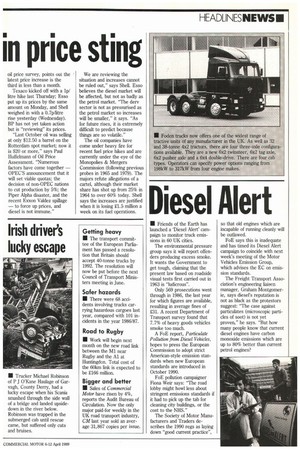Diesel Alert
Page 7

If you've noticed an error in this article please click here to report it so we can fix it.
• Friends of the Earth has launched a 'Diesel Alert' campaign to monitor truck emissions in 60 UK cities.
The environmental pressure group says it will report offenders producing excess smoke. It wants the Government to get tough, claiming that the present law based on roadside visual tests first carried out in 1963 is "ludicrous".
Only 569 prosecutions went through in 1986, the last year for which figures are available, resulting in average fines of 231. A recent Department of Transport survey found that 7.7% of heavy goods vehicles smoke too much.
A FoE report, Particulate Pollution from Diesel Vehicles, hopes to press the European Commission to adopt strict American-style emission standards when new European standards are introduced in October 1990.
FoE pollution campaigner Fiona Weir says: "The road lobby might howl less about stringent emissions standards if it had to pick up the tab for cleaning city buildings, or the cost to the NHS."
The Society of Motor Manufacturers and Traders describes the 1990 regs as laying down "good current practice", so that old engines which are incapable of running cleanly will be outlawed.
FoE says this is inadequate and has timed its Diesel Alert campaign to coincide with next week's meeting of the Motor Vehicles Emission Group, which advises the EC on emission standards.
The Freight Transport Association's engineering liaison manager, Graham Montgomerie, says diesel's reputation is not as black as the protestors suggest: "The case against particulates (microscopic particles of soot) is not yet proven," he says. "But how many people know that current diesel engines have carbon monoxide emissions which are up to 80% better than current petrol engines?




















































































































